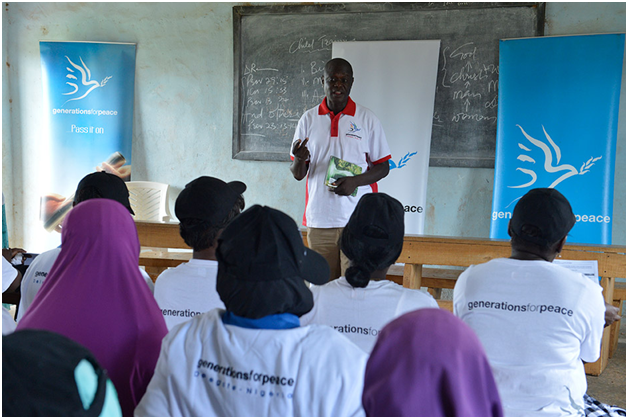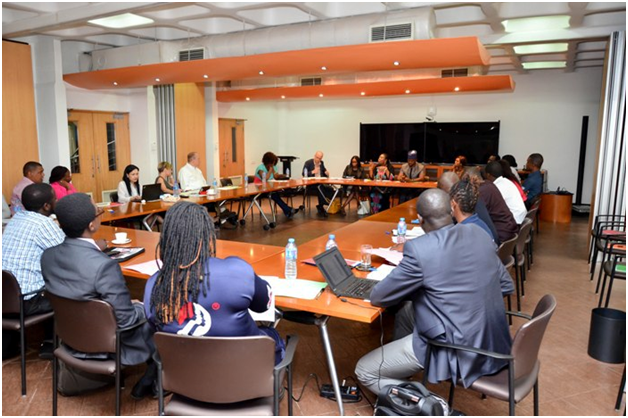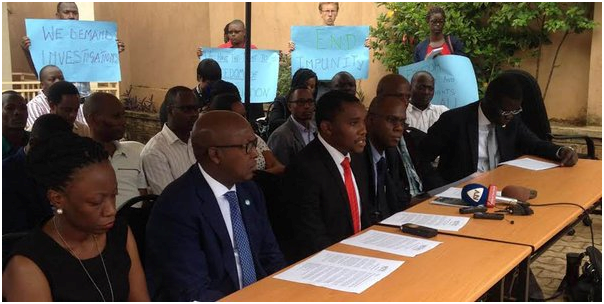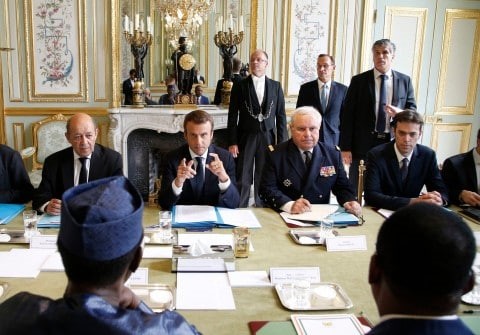
 The Executive Director’s Unit is mainly organized around two substantive program clusters:
The Executive Director’s Unit is mainly organized around two substantive program clusters:
(1) admin and financial matters and
(2) media and communication.
The Unit coordinates all the programs and chapters of AU Watch It works closely with the Governing Council and other Directorates – coordinating, supervising and providing guidance and advisory services.
The Unit achieves its mission by collaborating with other departments and units across AU Watch, including managing its blog ‘My Africa’. The Unit also supervises all public discussions of AU Watch, publications, working groups and briefings that bring together policymakers, practitioners, and subject matter experts to analyze and offer practical solutions and options for tackling key challenges at the AU and Africa.
Working with the other Departments and Units within the organization and external partners, the work programs within the Executive Director’s Unit focuses on achieving:
Inclusive governance and leadership: The fulcrum of peace, security and sustainable development is inclusive governance and leadership. Undoubtedly, Africa has made significant progress in democratic governance since the 1990’s, when only 3 African countries were characterized as democratic by Freedom House, compared to 28 in 2018. However, significant challenges remain. In interrogating governance challenges in Africa, much of the focus has been on presidential elections, term limits, and high-profile crises of leadership, to the exclusion of governance innovations at the local, state, and national levels. The Unit seeks to delve beyond the surface, to provide a comprehensive and in-depth look at leadership issues facing AU and its Members, distill the lessons learned, and offer options for strengthening institutions, systems, and processes that underpin inclusive and sustainable governance. There is also a focus on the participation of civil society in political decision-making processes, including their role in politico-economic dialogue and regional integration.
Political dialogue and crisis prevention:Supranational dialogue to questions of development and security; promotion of the intercultural and interreligious value dialogue.
 Conflict Prevention and Peace Building: While the number of armed conflicts in Africa and across the world has declined since the Cold War, several African countries still face latent tensions and active conflicts. In fact, as of 2018, Africa accounts for 9 of 16 ongoing United Nations peacekeeping missions as well as two African Union missions. It is clear that conflicts and tensions continues to impose a devastating impact on the continent, particularly in terms of the millions of lives lost and maimed, as well as development costs. Despite plenty of strategies for conflict management and post-conflict reconstruction, there remains a dearth of research into effective interventions to prevent conflict and build sustainable, peaceful communities. The Unit in collaboration with other AU Watch departments responds to this knowledge gap with policy-relevant research and enhanced dialogue focused on reviewing and analyzing current approaches, lessons learned, best practices, and options for more effective conflict prevention, peacebuilding, and state-building in Africa. Currently the Unit is investigating these issues under the banner of the ‘The Face of Africa’s New Terror – the Boko Haram and El Shabab Syndrome’. AU Watch wants to understand why conflicts happen and is committed to assisting the AU and Member States prevent and resolve deadly conflicts.
Conflict Prevention and Peace Building: While the number of armed conflicts in Africa and across the world has declined since the Cold War, several African countries still face latent tensions and active conflicts. In fact, as of 2018, Africa accounts for 9 of 16 ongoing United Nations peacekeeping missions as well as two African Union missions. It is clear that conflicts and tensions continues to impose a devastating impact on the continent, particularly in terms of the millions of lives lost and maimed, as well as development costs. Despite plenty of strategies for conflict management and post-conflict reconstruction, there remains a dearth of research into effective interventions to prevent conflict and build sustainable, peaceful communities. The Unit in collaboration with other AU Watch departments responds to this knowledge gap with policy-relevant research and enhanced dialogue focused on reviewing and analyzing current approaches, lessons learned, best practices, and options for more effective conflict prevention, peacebuilding, and state-building in Africa. Currently the Unit is investigating these issues under the banner of the ‘The Face of Africa’s New Terror – the Boko Haram and El Shabab Syndrome’. AU Watch wants to understand why conflicts happen and is committed to assisting the AU and Member States prevent and resolve deadly conflicts.
Politics and Consulting:The Executive Director’s Unit is the engine of AU Watch. As ‘thinkers and doers’, the Unit develops fundamental concepts for the entire organization, and in consultation with its Board of Governors design practical approaches for solving regional challenges related to the AU. We are committed to fact finding, to manage transfer of knowledge and political consulting. Our teams cover a wide range of political issues. We offer knowledge and expertise, develop studies and discussion papers, and organize workshops and expert round tables. Our goal is to rethink politics from the ground up.
 Trade, Investment, and Sustainable Development: Between 2001 and 2010, African countries accounted for 6 of the 10 fastest growing economies in the world. At the same time, more and more international partners demonstrated growing economic interest in Africa, and foreign direct investment in Africa enjoyed a decade of growth to reach $87 billion by 2014. Yet, as evidenced in part by their performance on the Millennium Development Goals targets, many African countries struggled to translate this economic growth into broad-based development and human security for the vast majority of their citizens. In collaboration with the SDD, the Unit interrogates Africa’s economic growth, challenges, and transformation and how African countries can more effectively tie resource endowment, economic growth, and international trade and investment to impactful delivery on the Sustainable Development Goals and human security in Africa.
Trade, Investment, and Sustainable Development: Between 2001 and 2010, African countries accounted for 6 of the 10 fastest growing economies in the world. At the same time, more and more international partners demonstrated growing economic interest in Africa, and foreign direct investment in Africa enjoyed a decade of growth to reach $87 billion by 2014. Yet, as evidenced in part by their performance on the Millennium Development Goals targets, many African countries struggled to translate this economic growth into broad-based development and human security for the vast majority of their citizens. In collaboration with the SDD, the Unit interrogates Africa’s economic growth, challenges, and transformation and how African countries can more effectively tie resource endowment, economic growth, and international trade and investment to impactful delivery on the Sustainable Development Goals and human security in Africa.
Africa’s Evolving Role in the Global Arena: Despite the periods of tremendous economic growth and successive waves of democratic consolidation that have taken place on the continent since the 1990s, many commentators still engage with an “Africa” that no longer exists, or an AU that is ineffective or even worse, useless. Nonetheless, significant challenges remain across the economic, political, and social spheres. The Unit seeks to challenge the dominant narrative of the continent by providing realistic and grounded assessments of the progress, challenges, and ways forward for African nations as their relations with international partners continue to evolve in an increasingly interdependent world. The program maintains a cross-cutting focus on the roles of women, youth, and technology, which are critical to Africa’s future: to supporting good governance, to securing peace, to mitigating poverty, and to assuring sustainable development.

Admin and financial matters: The Unit is charged with supervising the organization’s human resources and finance strategies and overseeing and approving the annual budget, the financial policy and performance of AU Watch, including the financial out-turn and statutory accounts, audit matters, and strategic human resources matters.
 Media and Communication: The future is here and it is now. Technology is changing the way we work, think and play. Media and communication are at the heart of such changes. AU Watch uses media and communication to advance the interest of human rights, good governance, democracy and development in the continent. And the Executive Director’s Office is at the hub of media matters.
Media and Communication: The future is here and it is now. Technology is changing the way we work, think and play. Media and communication are at the heart of such changes. AU Watch uses media and communication to advance the interest of human rights, good governance, democracy and development in the continent. And the Executive Director’s Office is at the hub of media matters.
For more information on the Policy & Admin Program, fact sheets, briefings reports, position and research papers, articles, news reports, communiqués, press statements and releases, legislative briefs, current laws, soft laws and hard laws, cases and much more, and what you can do to help advocate for policy, please email [email protected].